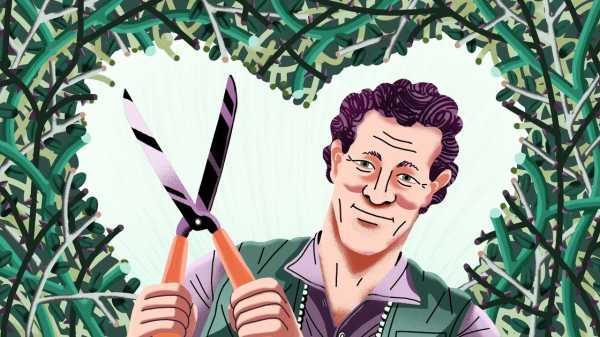
Who are gardening programs really for? For those already obsessed with horticultural matters, any moments of free time are spent sowing, sniffing, and tending one’s actual plants. For non-horticulture fans, why does it matter whether or not hardy double-flowered fuchsias thrive in full sun? Unlike food shows, gardening programs can’t tempt the casual passerby with lingering custard shots, or with Nigella Lawson speaking in perfect iambic pentameter while slicing mangoes. Plus, they have a cruel tendency to feature spaces that, compared with the squashed little patches of city dwellers, are sickeningly huge. Oh, you’re worried about which climbing rose to splay over your restored barn wall, are you, Muriel? You’re not sure how to ventilate your greenhouse? Please shut up. Some of us are struggling to stuff a second chili plant into a single scruffy window box and our patience is low.
However, true comfort-viewing transcends the need for common ground. The brilliance of “The Great British Bake Off,” the undisputed zenith of British TV cosiness, lies in its producers’ realization that a combination of empathy and Schadenfreude make anything enjoyable to watch. One doesn’t need to be a pastry pro to be gripped when arrogant Nigel’s butterscotch-and-pear five-layer gingerbread torte collapses, or to care desperately that the single mother Sue recovers her self-esteem. I’ve been watching the reruns; they make life almost bearable. I’ve also recently discovered a program that is almost as charmingly restful: a gardening show for people without wildflower meadows and ornamental stonework, for those who simply enjoy watching ordinary citizens make mistakes, nurse wild ambitions, and ultimately, to an extent, succeed. It’s the BBC’s “Big Dreams, Small Spaces,” currently on Netflix, and it stars not only clueless amateurs with absurdly troublesome real-life plots, full of tarmac, rubble, ground elder, and small children, but also the charismatic jeweller turned master gardener Monty Don.
Once, British gardening was dominated by glamorous aristocrats: Rhoda, Lady Birley, in a peacock-trimmed straw sombrero; or Nancy Lancaster, hot yet practical, with her rakish yellow kerchief and cashmere collar, shimmering with sexual confidence and fashion-forward pleating. In good news for democrats and bad news for breeches, those days have passed. Now we expect our horticultural celebrities to be no-nonsense, in easy-wash knitwear and hard-wearing slacks, and resolutely mainstream. In the past, though, the appeal of these British gardeners—a tousle-haired woman, an avuncular chap—has been, if you will, niche. Monty Don subverts that. Open about his struggles (bankruptcy, depression, a minor stroke), the owner of a range of gorgeous dogs and an immense garden in rural England from which he films his flagship gardening program, the faintly boring “Gardener’s World,” Monty combines reassuring poshness, accessibility, and, to be frank, good looks. (The man’s given name is Montagu, for heaven’s sake.) Best of all, he has a magnificent gardening wardrobe. Everything he wears—stevedore’s smocks, fisherman’s sweaters, cotton jackets like Modigliani might have worn for photo shoots, rugged corduroy trousers, braces (suspenders) fit for battle in 1917—looks exactly right: a sort of butch-dandy neo-artisan, ready for whittling action. It’s the stuff of Lady Chatterley’s more suitable dreams.
Even better, “Big Dreams, Small Spaces” combines this glamour with that essential of modern television: soi-disant relatability. The Ordinary People in these shows aren’t wealthy silver surfers who have downsized to just one acre, or hipster chef-gardeners rearing crops for micro-breweries. They are modest, unwealthy humans, with budgets in the hundreds, not hundreds of thousands, trying to improve their concreted front gardens, their hummocky suburban yards. Unlike the “small gardens” of other shows and magazines, which mysteriously have room for pergolas and duck ponds, these gardens are tiny. Better still, their owners are revolutionaries. It’s not decking they want but beehives, communal vegetables, urban jungles, and scented idylls for toddlers with special needs, and, because Monty will be coming round to check on them with his shepherd’s crook and clogs, they’d better rise to the challenge.
They rarely do. To design anything, one needs artistry and experience, particularly when one plans to turn a steeply sloped rubbish dump into a multi-sensory Philippine-style self-sufficient animal sanctuary complete with ruined mill and turrets. Monty draws up a plan, recommends plants … and then watches as his advisee fails to follow his advice to simplify and decides, instead, to add a functioning waterfall. Calmly, with an edge of despair, he tries to right their wrongs. Meanwhile, the cosily ominous voice-over (“But will Geoffrey’s leeks be ready for that all-important family Christmas buffet?”) and over-caffeinated village-band soundtrack (POM pom pom) suggest that the show’s participants are planning the D Day landing, not trying to prop up the compost bin before Monty comes to call. Oddly, one falls for it. Oh no, Sasha’s overspent on her industrial sheeting! Tariq forgot the trees!
It’s not quite edge of seat. But, like “The Great British Bake Off,” “Big Dreams, Small Spaces” is mildly gripping, deeply soothing, and, thanks to the invariably awkward group celebrations at the show’s end, with iced biscuits round the guinea-pig hutch and shy cheering, it is reminiscent of the best sort of garden parties—the ones the viewer doesn’t have to be at. Without wanting to objectify Monty in his indigo sailor’s trousers, he and his vintage apple-picker are always welcome in my living room. The next time I am low, or garden deprived, I plan to slip into my Yves Saint Laurent pruning jacket and silken headscarf and begin Season 3.
Sourse: newyorker.com






